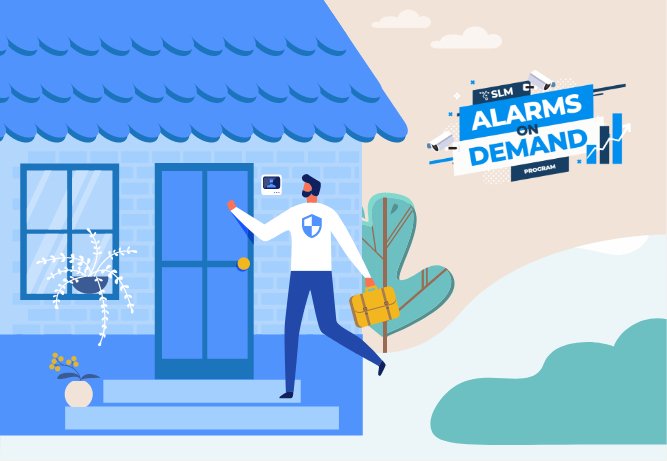If you’re an Alarm dealer reading this, then you know 2020 was a complete write-off. Nation-wide lockdowns, mass hysteria, and a new form of social safety protocols were adopted by most people. This recipe created a near-impossible condition for door-2-door businesses to operate, let alone survive. But did you know a handful of dealers across USA and Canada made a few pivots and actually experienced growth? In this article, we outline how they did it, and why it matters to you.
Don’t overlook one over the other.
When you initially started in the Alarm industry, perhaps as a junior sales rep, you were in a room with about a dozen other professionals. A mildly electric energy was in the air as you met your new coworkers; most of whom were also starting out. It was the start of the season, and the sales manager was jacked up on Redbull, in front of the room pitching his life story. He spoke of wild and adventurous stories. How mastering the doors was the best decision he ever made. How it helped him conquer his fears, improve his social skills, and build relationships in his personal life. How he learned a profession that enabled him to be paid whatever he wanted when he wanted to work.
“Door-to-door is the best business model you will ever want to be in, and I have 2 really good reasons why.”
You leaned in to hear more.
“First, it’s an untapped opportunity, because no one has the balls to knock on doors but you,” pausing only slightly to get a few laughs before he continued. “Second, you don’t have to spend money on marketing to generate sales. You just have to knock on doors. No other business can do that”.
Challenging outdated perceptions
The presentation ended. The room broke into groups to perform training, product knowledge and learning more about the art of making deals. If you were like most sales reps who eventually became dealers, once you learned how much money you can make, you overlooked the details. After all, in a business with an endless amount of doors to go knock on, sky-high commission to be earned, what was there really to innovate upon?
“Don’t try to reinvent the wheel,” explained one manager, at some point to someone, within earshot of you hearing. “Stick to the process.”.
The premise that door-to-door was the only way to sell alarms was conflated with door-to-door being the best way to sell alarms. Most dealers in the industry never looked into other strategies, only because they never thought beyond the art of door knocking. Quietly, behind the scenes, the Big Guys (you know who we’re talking about), were investing tens of thousands each month into search optimization, Facebook ads, and overall branding. And as an added insurance policy, they were also training their new reps that “you don’t have to spend money on marketing to generate sales”. It was the best way to reduce the number of top-performing salespeople from starting their own dealerships.
And when your sales manager ingrained in your soul through countless repetitions that, “I just want to think about it,” is a smokescreen (and you weren’t doing a good enough job). Corporate alarm companies had a few teams of marketing whiz kids building out relevant content for consumers who wanted to research, who wanted to wait for a better deal, or who wanted to review competitors. You know – marketing strategies that every other non-door-to-door business has to manage.
When David fights like Goliath
Then 2020 comes along and no one’s allowed outside, everyone’s creeped out by strangers, and toilet paper is in short supply. How were the doors then? Don’t actually answer that. This is when most dealers hung up their gloves and kicked their feet up. Some, got creative. After all, just like everyone else, they were on Facebook. They saw that a tremendous amount of businesses are advertising (including big alarm companies). They thought, why couldn’t they?
With a little research, they realized that Big Alarm companies usually overcharge, offer less equipment, or that there’s SOMETHING different and unique to being a small-time dealer. Most would say, it’s why it’s better to buy from a dealer than corporate. In addition to that, Facebook enables small businesses to “niche-down” by creating content that their customers like to engage in; they can advertise based on interests, demographics, and location (among many other variables not worth getting in-depth about).
The smell of opportunity
In a nutshell, here’s what the Creative-Dealer did next. He basically wrote his pitch out on paper, which is known as “copy”. He took note of what Big Alarm companies ads look like, and replicated them with his own twist. The “look” of an ad (what you see when you’re scrolling through Facebook) is known as the “creative”. He then had a 2-page website, where more depth about his pitch was written out and a “schedule now” button that would lead to a calendar. From there, he connected his calendar link to his Zoom account, so if anyone made an appointment he could have a virtual consultation with them and pitch them over the computer. Then he put it all together in the Facebook ads manager, hooked up his credit card, and the rest is history.
*There’s actually more to running ads than that, but for brevity sake we will skip to the big breakthrough.*
Remember how you were once told that You don’t need to spend money on marketing to make sales? Well, let’s reveal the truth. Believe it or not, you can buy your customers. And that’s exactly what the Creative Dealer discovered. At first, he would buy a lead for $40. After several adjustments a few weeks he was getting his leads for $4.50 a pop! Similarly, at first, a few leads would trickle in a week. After a few adjustments, 10 or more was normal.
Let’s do the math. Spend $400 a week on ads. Let’s say 5000 people saw the ads, and out of that 5000, only 20 scheduled a consultation. That’s conservative. $20 a lead. And that’s high but totally possible for a newby. Out of 20 leads, let’s say 20% converted. 4 customers signed up. Now, you know you’re likely to sell only top dollar packaged, but let’s just say the average customer is worth $500 profit. Still with us? In summary, in 1 week you spent $400 to make $2000. How many times would you spend $400 to make $2000? And what do you think happens if you delayed gratification to reinvest the entire $2000? Big money, baby.
Conclusion
And there you have it. The truth that door-to-door isn’t the only way to turn a trick. You can totally grow your dealership from your computer (in your underwear, if you wanted). The question is, are you willing to invest a few hours a week to learn a new skillset? The art of writing copy, making cool creatives, building a funnel, and optimizing ads is totally within reach, it just takes practice. And if you’re looking to learn from someone who has actively worked with 20 dealers at once applying this exact strategy, that’s exactly what we do at Installs on Demand. We train alarm dealers how to leverage the internet to grow their business and resist economic instability. Interested? Click here and schedule a call with Andrew to learn more. Otherwise, thank you for reading and we’ll talk again soon. PEACE.
Inspiration
Home
Topics
digital door knocking, need to adapt, quicker ways to reach customer without walking



